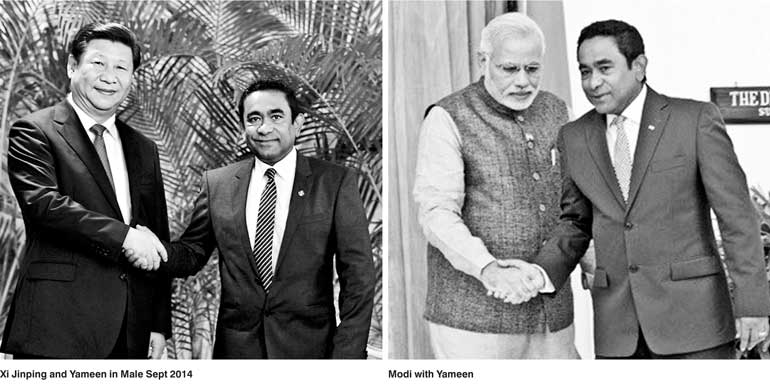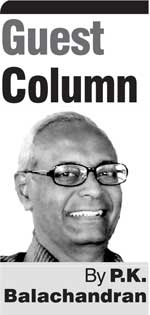Tuesday Feb 17, 2026
Tuesday Feb 17, 2026
Saturday, 10 February 2018 00:25 - - {{hitsCtrl.values.hits}}

The political situation in the Maldives is now at a critical stage with the possibility of international intervention in one form or another due to the efforts of the internationally influential Maldivian Opposition Leader in exile, Mohamed Nasheed.
A former President of the Maldives and now the Opposition’s mascot, Nasheed had rather brazenly asked for a “military-backed” Indian diplomatic intervention.
To justify this demand and to allay any fears Maldivians may have about an “Indian occupation” of the Maldives as a result of his invitation, Nasheed recalled what India did in 1988.
He said that in Operation Cactus of 1988, the Indian Navy promptly withdrew after foiling a bid by Sri Lankan Tamil militants belonging to the Peoples‘ Liberation Organisation of Tamil Eelam (PLOTE), to overthrow the then Maldivian President Maumoon Abdul Gayoom.
Nasheed said that it is safe to seek Indian help because the Indians would do the job and leave as they did in 1988. But there has been no response from New Delhi to Nasheed’s demand couched diplomatically as a “humble request”.
India’s displeasure with Male
However, sensing a big juicy story waiting to be exploited, the fiery Indian electronic media roped in strategic “experts” to urge intervention, if only to assert India’s power vis-à-vis China which has gained ground in the Maldives since Abdulla Yameen was elected President in 2013.
Despite its studied silence, it is clear that New Delhi is displeased with Male. This was evident when it declined to entertain a Maldivian Special Envoy who was going to come to explain the Yameen government’s case on the crisis.
The envoy would have told the Indian leaders how the Supreme Court’s procedures and its orders to release top opposition leaders and reinstate unseated members of parliament, bristled with illegalities; also how these moves wreaked of a deep and well-planned conspiracy to overthrow a legitimately established government. The envoy would have urged the powers that be in New Delhi to see the issues legally and dispassionately.
But New Delhi used the absence of External Affairs Minister Sushma Swaraj and Prime Minister Narendra Modi’s scheduled visit to the UAE this week as excuses for not entertaining Yameen’s envoy. However, the Maldivians have taken this with a pinch of salt and believe that India deliberately cold shouldered them to show its overall displeasure with the Yameen regime.
Perhaps India wanted to send a message that it is not at all pleased with the Yameen regime’s frontal assault on the Maldivian Opposition. As of date, the Opposition is pro-India, pro-West, and anti-China to boot. Perhaps India was also put off by the Yameen regime’s decision to send a special envoy to China and Pakistan. India’s past behaviour indicates that if it is to intervene, it would like to do it solo, without any other country alongside it. It would certainly not like to be in the company of Pakistan and China. No way.
 Lost opportunity
Lost opportunity
But then, by cold shouldering the Maldivians, New Delhi may have lost an opportunity to constructively engage with the Yameen government as well as the Opposition, and be a useful mediator.
Maldives needs a mediator. China, which is the Maldives’ only really useful friend, has said so too explicitly.
Chinese Foreign Ministry Spokesman Geng Shuang has said that though the current issues in the Maldives are best solved internally by talking across a table, the international community can also play a “constructive role” but without disrespecting Maldives’ sovereignty.
Beijing may have used the visit of the special envoy to lay the foundation for such a “constructive role” for itself. China has the economic clout to play that role, given the fact it is contributing the bulk of development funds received by the Maldives from overseas.
China’s role
China is modernising Male’s airport, building a new township in nearby Huluhumale, and constructing a bridge to link it with mainland Male. The Chinese are the single largest group among tourists arriving in the Maldives, accounting for 324,000 in a total of 1.3 million arrivals in 2017.
Apart from briefing the Chinese leaders about the situation in the Maldives; the reasons why the government had to declare a state of emergency and take the stern measures it did; the special envoy would also have told the Chinese that it is extremely important to have the Chinese travel advisory lifted.
China’s travel advisory was unusually harsh and stood in sharp contrast to the advisories from the US, UK and India. It had asked its citizens to “avoid” the Maldives “till the political situation stabilizes”.
According to sources in Male, this advisory has led to a spate of cancellations of Chinese bookings in resorts and hotels causing a great loss to the tourist industries.
China is believed to have issued a definitive warning because a very large number of Chinese take off for destinations abroad during the Chinese New Year observances in the latter part of February. Many would go to the Maldives too and Beijing has a responsibility to safeguard the life and limb of Chinese travellers.
The special envoys sent out to China, Pakistan, and Saudi Arabia would have assured the governments of these countries that there is peace and normalcy in Male and the resorts, that it is business as usual, and that their investments are and will be safe.
Indeed, the political conflict in the Maldives appears to be a struggle between politicians and political groups for power and the loaves and fishes of office rather than a struggle of the masses.
Maldivians have been living in the midst of political instability and arbitrary actions on the part of the powers-that-be and irresponsible actions and utterances on the part of the opposition of the day for a decade now and have grown indifferent to the goings on.
As the government has said, there is no curfew and no barriers to normal movement and business transactions. International travel writers have also given the thumbs up for Maldivian tourism even as recently as Wednesday.